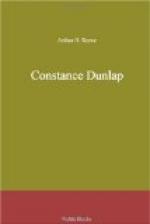Drummond turned surlily to those of his “dope squad,” who remained:
“You can go, boys,” he said brusquely.
“There’s been some mistake here.”
CHAPTER XII
THE FUGITIVES
“Newspaper pictures seldom look like the person they represent,” asserted Lawrence Macey nonchalantly.
Constance Dunlap looked squarely at the man opposite her at the table, oblivious to the surroundings. It was a brilliant sight in the great after-theater rendezvous, the beautiful faces and gowns, the exquisite music, the bright lights and the gayety. She had chosen this time and place for a reason. She had hoped that the contrast with what she had to say would be most marked in its influence on the man.
“Nevertheless,” she replied keenly, “I recognize the picture—as though you were Bertillon’s new ‘spoken portrait’ of this Graeme Mackenzie.”
She deliberately folded up a newspaper clipping and shoved it into her hand-bag on a chair beside the table.
Lawrence Macey met her eye unflinchingly.
“Suppose,” he drawled, “just for the sake of argument, that you are right. What would you do?”
Constance looked at the unruffled exterior of the man. With her keen perception she knew that it covered just as calm an interior. He would have said the same thing if she had been a real detective, had walked up behind him suddenly in the subway crush, had tapped his shoulder, and whispered, “You’re wanted.”
“We are dealing with facts, not suppositions,” she replied evasively.
Momentarily, a strange look passed over Macey’s face. What was she driving at—blackmail? He could not think so, even though he had only just come to know Constance. He rejected the thought before it was half formed.
“Put it as you please,” he persisted. “I am, then, this Graeme Mackenzie who has decamped from Omaha with half a million—it is half a million in the article, is it not?—of cash and unregistered stocks and bonds. Now what would you do?”
Constance felt unconsciously the shift which he had skilfully made in their positions. Instead of being the pursuer, she was now the pursued, at least in their conversation. He had admitted nothing of what her quick intuition told her.
Yet she felt an admiration for the sang-froid of Macey. She felt a spell thrown over her by; the magnetic eyes that seemed to search her own. They were large eyes, the eyes of a dreamer, rather than of a practical man, eyes of a man who goes far and travels long with the woman on whom he fixes them solely.
“You haven’t answered my hypothetical question,” he reminded her.
She brought herself back with a start. “I was only thinking,” she murmured.
“Then there is doubt in your mind what you would do?”
“N—no,” she hesitated.
He bent over nearer across the table. “You would at least recall the old adage, ’Do unto others as you would that they should do unto you’?” he urged.




